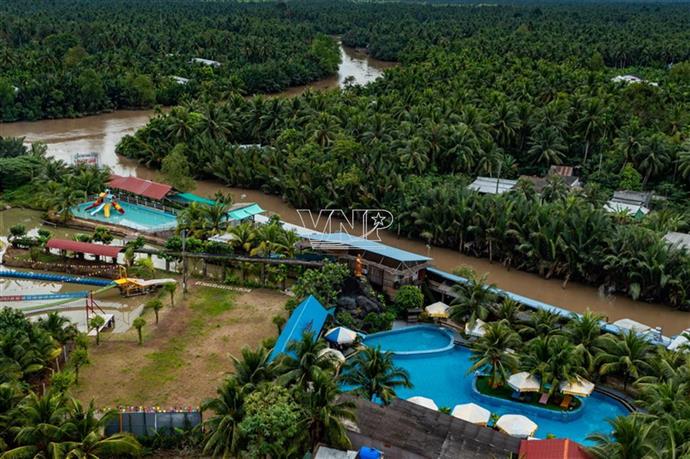Lam Dong, March 23 (VNA) – The Central Highlands province of Lam Dong has taken numerous measures to develop and protect the brand name of Arabica coffee grown in Cau Dat district, Da Lat City.
Arabica coffee from Cau Dat was one of the seven kinds of coffee sold in the world by the US-based Starbucks. It was also the first time Arabica coffee grown in Vietnam had been selected by the group to sell at its more than 21,000 stores across the globe.
Cau Dat, located at the altitude of 1,500 metres, has over 3,000 hectares under coffee trees in Xuan Truong and Tram Hanh communes, and part of Xuan Tho commune in Da Lat City. It has favourable natural and geographical conditions for growing Arabica coffee.
However, there is now a trend in the area to replace coffee by other crops such as vegetables and flowers.
Luu Van Phat, a farmer in Tram Hanh commune’s Phat Chi hamlet, said many villagers have shifted to growing vegetables and flowers, which brings more profit than Arabica coffee.
According to Director of the Cau Dat Coffee Cooperative Vo Khanh, the cultivation of Arabica coffee requires high investment and big efforts because the trees are highly vulnerable to diseases and cold weather. One hectare of Arabica coffee brings around 100 million VND (4,400 USD) in revenues, much lower than vegetable and flower crops.
The cooperative has just signed a contract to ship seven tonnes of Green Fairtrade coffee beans to the Republic of Korea (RoK), Khanh said, adding that it is an optimistic sign for the future of the local Arabica coffee.
The cooperative has joined the World Fairtrade coffee network since 2015 with 30 members, producing 130 tonnes of coffee beans per year.
The provincial People’s Committee has issued a plan to expand the area of Arabica coffee trees to 30,000 hectares by 2020, turning the south Central Highlands into one of the world’s best Arabica coffee producing regions.
According to the Economics Office of Da Lat City, high-yield and high-quality coffee varieties will be selected to replace old coffee trees and effective cultivation models will be transferred to coffee farmers in the locality in order to increase productivity and coffee bean quality.
Arabica coffee from Cau Dat was one of the seven kinds of coffee sold in the world by the US-based Starbucks. It was also the first time Arabica coffee grown in Vietnam had been selected by the group to sell at its more than 21,000 stores across the globe.
Cau Dat, located at the altitude of 1,500 metres, has over 3,000 hectares under coffee trees in Xuan Truong and Tram Hanh communes, and part of Xuan Tho commune in Da Lat City. It has favourable natural and geographical conditions for growing Arabica coffee.
However, there is now a trend in the area to replace coffee by other crops such as vegetables and flowers.
Luu Van Phat, a farmer in Tram Hanh commune’s Phat Chi hamlet, said many villagers have shifted to growing vegetables and flowers, which brings more profit than Arabica coffee.
According to Director of the Cau Dat Coffee Cooperative Vo Khanh, the cultivation of Arabica coffee requires high investment and big efforts because the trees are highly vulnerable to diseases and cold weather. One hectare of Arabica coffee brings around 100 million VND (4,400 USD) in revenues, much lower than vegetable and flower crops.
The cooperative has just signed a contract to ship seven tonnes of Green Fairtrade coffee beans to the Republic of Korea (RoK), Khanh said, adding that it is an optimistic sign for the future of the local Arabica coffee.
The cooperative has joined the World Fairtrade coffee network since 2015 with 30 members, producing 130 tonnes of coffee beans per year.
The provincial People’s Committee has issued a plan to expand the area of Arabica coffee trees to 30,000 hectares by 2020, turning the south Central Highlands into one of the world’s best Arabica coffee producing regions.
According to the Economics Office of Da Lat City, high-yield and high-quality coffee varieties will be selected to replace old coffee trees and effective cultivation models will be transferred to coffee farmers in the locality in order to increase productivity and coffee bean quality.
VNA/VNP

















